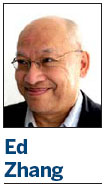Big year ahead once key meeting over
Updated: 2013-12-06 10:02
By Ed Zhang (China Daily Europe)
|
|||||||||||
Anxiety mounts as plenum decisions on economic reforms await to be put into action
The Central Economic Work Conference, the yearly policy planning meeting, is due to take place before the end of the year, and 2014 is shaping up to be a busy year for China business.
The China Securities Regulatory Commission has said that China will open the floodgates on new share listings for the domestic share market next year following changes in listing rules this year. There may be as many as 50 companies in the first batch of listings.
State-owned enterprises could start a new round of restructuring if they digest the reform program that came out from the recent Third Plenum of the Communist Party of China 18th Central Committee. They are expected to scale back their domination in competitive markets and to become more focused on their investment businesses.
There will also be interesting changes in the financial market, in administering agriculture and farmland, and in developing cities.
But before investors discover all the changes now taking place, one should appreciate what is bringing them along, especially the ideas that underpin the 60-point reform program the Third Plenum adopted.
Three themes appear to run through the document.
One is that the reform program is intended to be different from either the Washington Consensus or Beijing Consensus, as economists call them. The former means, by and large, a minimum government role in the economy and maximum competition in the market; and the latter, a name assigned by some foreign commentators, can mean maximum government control of the economy, with limited room for government-targeted competition.
It is clear from the document that Chinese decision-makers recognize that the market is indispensable. Otherwise they would not have assigned it the "decisive role" in allocating resources.
The tricky part is that not a single word was uttered on reducing the government's regulatory role - although its direct control of the economy, such as administrative approval powers, is meant to be reduced markedly. A strong regulatory state will not only co-exist with an open, competitive market, but also make policies to help the market do its job.
Some economists call such policies market-enhancing or market-augmenting, and Chinese leaders like to call their idea of administration service-oriented government.

Market-enhancing policies do not always have to provide what the market wants, especially when the demand comes primarily from local governments. Excessive short-term provision of finance, as seen everywhere in the world, leads to long-term dangers.
Nothing defends an economy better than fiscal prudence - at government and corporate levels. This may call for of regulatory maneuvers whose main task is to prevent cyclical fluctuations.
The remedy is a counter-cyclical system, as proposed by Guan Jianzhong, president of Dagong Global Credit Rating Co based in Beijing.
Guan criticizes what he calls the pro-cyclical approach that credit rating agencies have been using. That approach, doing nothing other than following a business cycle, is a cruel game, he says, because in a boom cycle, or at times of easy money, it tends to overrate a debtor's credit-worthiness and encourage it to borrow more; but when recession comes, it tends to underrate a debtor's credit-worthiness abruptly and allows it very little time to reorganize itself before throwing it into deeper trouble.
So the old approach tends to cause the economy to fluctuate more wildly between credit bubble and widespread default, and it was a culprit in the 2008 global financial crisis.
Guan says his new approach, by focusing more on a debtor's profit-generating capability, will help the economy make its business cycle less vicious, if not iron it out.
Profit-generating capability has much to do with productivity and its social setting - which is yet another key component of the third plenum's reform program. That means striking a balance between long-term incentives for entrepreneurial ventures and improved welfare sooner for all citizens.
The three themes - market-enhancing policies, counter-cyclical regulation, and a balance between productivity and social policies - have to be embodied in many specific decisions to really work. As to how they will work, the government still has to prove by action.
The author is editor-at-large of China Daily. Contact the writer at edzhang@chinadaily.com.cn.
(China Daily European Weekly 12/06/2013 page13)
Today's Top News
Chinese-French voters seek louder voice
Trade surplus hit record high in Nov
Japan's secrets law raises fears
China allows rouble in border city
Gaokao reform removes English
'Two-child' rules to go from 2014
Institute keen to spread word
Cameron answers questions on Weibo
Hot Topics
Lunar probe , China growth forecasts, Emission rules get tougher, China seen through 'colored lens', International board,
Editor's Picks

|

|

|

|

|

|





